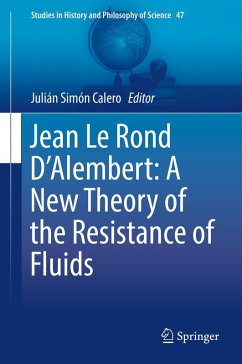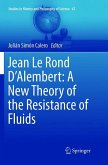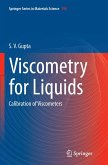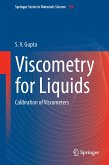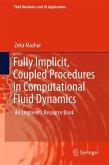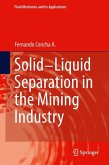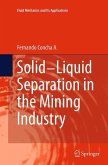Jean Le Rond D'Alembert: A New Theory of the Resistance of Fluids
Herausgegeben:Calero, Julián Simón
Jean Le Rond D'Alembert: A New Theory of the Resistance of Fluids
Herausgegeben:Calero, Julián Simón
- Gebundenes Buch
- Merkliste
- Auf die Merkliste
- Bewerten Bewerten
- Teilen
- Produkt teilen
- Produkterinnerung
- Produkterinnerung
In the commentaries to this book we try to understand d'Alembert thoughts and how he contrives to translate his ideas on mechanics to the fluid realm with a new and radical point of view; how he arrives at the first two fundamental differential equations among the velocity components; and how he tries to reduce the resistance of a moving body, which is a change of its momentum, to the hydrostatical pressure, which is related to the gravity. All this knowing that his mechanics has no forces and no pressures as well, and that the fluids are aggregates of individual particles.
The essay A New…mehr
Andere Kunden interessierten sich auch für
![Jean Le Rond D'Alembert: A New Theory of the Resistance of Fluids Jean Le Rond D'Alembert: A New Theory of the Resistance of Fluids]() Jean Le Rond D'Alembert: A New Theory of the Resistance of Fluids82,99 €
Jean Le Rond D'Alembert: A New Theory of the Resistance of Fluids82,99 €![Viscometry for Liquids Viscometry for Liquids]() S. V. GuptaViscometry for Liquids75,99 €
S. V. GuptaViscometry for Liquids75,99 €![Viscometry for Liquids Viscometry for Liquids]() S. V. GuptaViscometry for Liquids75,99 €
S. V. GuptaViscometry for Liquids75,99 €![Fully Implicit, Coupled Procedures in Computational Fluid Dynamics Fully Implicit, Coupled Procedures in Computational Fluid Dynamics]() Zeka MazharFully Implicit, Coupled Procedures in Computational Fluid Dynamics112,99 €
Zeka MazharFully Implicit, Coupled Procedures in Computational Fluid Dynamics112,99 €![Otto Lilienthal Otto Lilienthal]() Otto Lilienthal37,99 €
Otto Lilienthal37,99 €![Solid-Liquid Separation in the Mining Industry Solid-Liquid Separation in the Mining Industry]() Fernando ConchaSolid-Liquid Separation in the Mining Industry56,99 €
Fernando ConchaSolid-Liquid Separation in the Mining Industry56,99 €![Solid-Liquid Separation in the Mining Industry Solid-Liquid Separation in the Mining Industry]() Fernando ConchaSolid-Liquid Separation in the Mining Industry56,99 €
Fernando ConchaSolid-Liquid Separation in the Mining Industry56,99 €-
-
-
In the commentaries to this book we try to understand d'Alembert thoughts and how he contrives to translate his ideas on mechanics to the fluid realm with a new and radical point of view; how he arrives at the first two fundamental differential equations among the velocity components; and how he tries to reduce the resistance of a moving body, which is a change of its momentum, to the hydrostatical pressure, which is related to the gravity. All this knowing that his mechanics has no forces and no pressures as well, and that the fluids are aggregates of individual particles.
The essay A New Theory of the Resistance of Fluids was a turning point in Fluid Mechanics because clearly, for the first time, the resistance is shown as the results of a fluid subjected to differential equations in a continuous mode instead of a set of impacts of individual particles. This contribution has been recognized by the scholars. However, only partial attention has been p
aid to this work, which can be justified due to the difficulty in its reading and also because it was eclipsed by the publication, a few years later, of Euler's three Memoirs that established modern hydrodynamics.
The essay A New Theory of the Resistance of Fluids was a turning point in Fluid Mechanics because clearly, for the first time, the resistance is shown as the results of a fluid subjected to differential equations in a continuous mode instead of a set of impacts of individual particles. This contribution has been recognized by the scholars. However, only partial attention has been p
aid to this work, which can be justified due to the difficulty in its reading and also because it was eclipsed by the publication, a few years later, of Euler's three Memoirs that established modern hydrodynamics.
Produktdetails
- Produktdetails
- Studies in History and Philosophy of Science 1001
- Verlag: Springer / Springer International Publishing / Springer, Berlin
- Artikelnr. des Verlages: 978-3-319-67999-0
- 1st ed. 2018
- Seitenzahl: 304
- Erscheinungstermin: 22. Januar 2018
- Englisch
- Abmessung: 241mm x 160mm x 22mm
- Gewicht: 624g
- ISBN-13: 9783319679990
- ISBN-10: 3319679996
- Artikelnr.: 48911048
- Herstellerkennzeichnung
- Springer Nature c/o IBS
- Benzstrasse 21
- 48619 Heek
- Tanja.Keller@springer.com
- Studies in History and Philosophy of Science 1001
- Verlag: Springer / Springer International Publishing / Springer, Berlin
- Artikelnr. des Verlages: 978-3-319-67999-0
- 1st ed. 2018
- Seitenzahl: 304
- Erscheinungstermin: 22. Januar 2018
- Englisch
- Abmessung: 241mm x 160mm x 22mm
- Gewicht: 624g
- ISBN-13: 9783319679990
- ISBN-10: 3319679996
- Artikelnr.: 48911048
- Herstellerkennzeichnung
- Springer Nature c/o IBS
- Benzstrasse 21
- 48619 Heek
- Tanja.Keller@springer.com
Julián Simón obtained the degree in Aeronautical Engineering of the Polytechnical University of Madrid in 1966. For more than 40 years, until his retirement in 2007, he worked in the Spanish National Institute for Aerospace Technology (INTA). He passed through all the professional positions of the Institute. However, in those 40 years, his principal tasks were related to rockets, from sounding rockets until launcher vehicles. He worked in aerodynamics, flight dynamics, solid motors and project management. He also participated in several international committees as the Spanish representative. From the beginning of his professional life he was involved in the Spanish National Aeronautical Association, being elected member of the board several times. In 1986 he obtained the degree in Philosophy in the Spanish Open University (UNED) and in 1992 the doctorate. Even when his main job was always rather intense, he tried to combine it with the History of Science, especially the origin of the fluid mechanics, given his knowledge of that subject. He has produced two books and several articles on this matter.
Part I: Sustainable Tropical Agriculture,- Chapter 1: Induce Resistant using Trichoderma spp. and Penicillium sp. against Banded Leaf and Sheath Blight (BLSB) caused by Rhizoctonia solani in Maize (Amarilisa Kusuma, Ani Widiastuti and Achmadi Priyatmojo).- Chapter 2: Detection of Resistance against Begomovirus using SCAR Marker on Melon (Cucumis melo L. cv. Hikapel) (Aprilia Sufi Subiastuti, Ulinnuha Erlina Fatmawati and Budi Setiadi Daryono).- Chapter 3: The Influence of Cow Manure and Chicken Manure on Soil Fauna Abundance and Nitrogen Uptake of Rice Plant of Conventional to Organic Farming System (Indah Utami, Sri Nuryani Hidayah Utami and Siwi Indarti).- Chapter 4: The Study of Technology Adoption on Integrated Crop Management (PTT) of Paddy Rice in Aceh Province (Basri A. Bakar, Abdul Azis and Nazariah).- Chapter 5: Growth and Yield of Three Rice Cultivars in Several Salinity Levels at Coastal Sandy Soil of Yogyakarta (Budiastuti Kurniasih, Nur Azizah Uswatun Hasanah and Tohari).- Chapter 6: Genetic Diversity of Pyricularia oryzae the Causal Agent of Rice Blast Disease Based on Repetitive Element-based Polymerase Chain Reaction (Danar Wicaksono, Arif Wibowo and Ani Widiastuti).- Chapter 7: Effectiveness of Manure Addition and Mycorrhiza on Phosphorus Uptake and Yield of Mayze in Inceptisol Kalitirto (Dasih Rahmawati, Sri Nuryani Hidayah Utami and Cahyo Wulandari).- Chapter 8: Effect of Rice Husk Ash in Physiological Responses of Rice (Oryza sativa L.) 'Cempo Merah' and 'Segreng' under Drought (Diah Rachmawati, Maryani, and Ulfatul Masruroh).- Chapter 9: Molecular Evidence for Mixed Infections of Four Begomoviruses on Common Beans and Yard Long Bean Showing Severe Yellow Symptoms in East Java, Indonesia (Effi Alfiani Sidik, Sedyo Hartono, Sri Sulandari, Rudy Lukman, Ahmad Affifudin, Denih Wahyudin and Haryono Budi Santoso).- Chapter 10: The Effect of Peptone on Embrio Development of Orchid During In Vitro Culture (Endang Semiarti, Nintya Setiari, Wahyu DewiAstutiningrum, Steffani Nurliana and Windi Mose).- Chapter 11: Competitiveness Analysis of Sugarcane Farming in Bantul (Hadfina Nurjanah, Masyhuri, Suhatmini Hardyastuti and Hani Perwitasari).- Chapter 12: Effect of Phosphorus and Zinc Fertilizers, Straw Compost on the Content of Phosphorus and Zinc in Rice (Hamidah Hanum and Yaya Hasanah).- Chapter 13: Detection of Mycotoxin-encoding Genes in Fusarium spp. Isolated from Maize Kernels in Indonesia (Kurnia Ritma Dhanti, Ani Widiastuti and Tri Joko).- Chapter 14: Factors Influencing the Activeness of Agricultural Co-operative Members in Yogyakarta Special Region (Lestari Rahayu Waluyati, Jamhari and Abi Pratiwo Siregar).- Chapter 15: Reactive Oxygen Species (ROS) by Trichoderma spp. against Downy Mildew in Maize (Lili Asmawati, Ani Widiastuti and Christanti Sumardiyono).- Chapter 16: Molecular Performance of MTG (Moderat Tahan Gano) Oil Palm Variety based on SSR Markers (Lillo Agustina P. Putri, Hot Setiado, Indra Syahputra, Deni Arifiyanto and Rika Hardianti).- Chapter 17: Impact of "System of Rice Intensification" to the Abundance of Rice Pests(Mofit Eko Poerwanto and Oktavia Sarhesti Padmini).- Chapter 18: Stabilization of Food Self Sufficiency through Biomanagement Agroforestry Systems in Industrial Plantation Forest (Muhammad Hatta).- Chapter 19: Analysis of Agronomic Characters in Soybean Genotype by Antioxidant Application under Salt Stress (Nini Rahmawati, Revandy Iskandar Muda Damanik and Rosmayati).- Chapter 20: Fish Quality Evaluation Using Quality Index Method (QIM), Correlating with Physical, Chemical and Bacteriological Changes During the Ice-Storage Period: A Review (Nodali Ndraha).- Chapter 21: Analysis of SOM and Soil Nutrients for Sustainable Agriculture in Hilly Areas: Central Part of Bogowonto Catchment, Java, Indonesia (Nur Ainun Pulungan, Sri Nuryani Hidayah Utami, Benito Heru Purwanto, Junun Sartohadi, Clemens Geitner, Johann Stötter),- Chapter 22:Roots Anatomy and Growth Responses of Soybean (Glycine max (L.)Merr.) 'Wilis" to NaCl Stress (Nuri Khasanah and Maryani).- Chapter 23: The Influences of Plant Residue Input at Two Coastal Land Uses to Soil Dissolved Base Cations (Rabiatul Jannah, Azwar Maas and Sri Nuryani Hidayah Utami).- Chapter 24: Role of Extension Workers in Promoting the Integrated Farming System Sustainability in Yogyakarta, Indonesia (Raden Ahmad Romadhoni Surya Putra and Fransiskus Trisakti Haryadi).- Chapter 25: Pathogenicity of Nematofagous Fungal to Control Nematode Pratylenchus coffeae to Coffee Plant (Rinda Fajrin Aldina, Siwi Indarti and Arif Wibowo).- Chapter 26: Genetic Advance, Heritability and Correlation of Agronomic Characters of Soybean (Glycine max L.) F4 Hybridization between Salt Resistance Genotype and Anjasmoro Variety.- Chapter 27: Analysis of the Household Economics of Ex-Rubber Farmers UPP TCSDP in Koto Damai Village of Kampar Kiri Tengah District Kampar Regency (Shorea Khaswarina).- Chapter 28: Local Food Institutions Empowerment in Lombok Barat District (Sri Peni Wastutiningsih, Subejo, Moh. Taqiuddin and Dyah Woro Untari).- Chapter 29: Influence of Biological and Inorganic Fertilizer Combination against Two Varieties of Soybean in Labulia Semiarid Central Lombok (Sukmawati).- Chapter 30: Partial Nutrient Budget from Lowland Forests Converted to Oil Palm and Rubber Plantations in Sumatra, Indonesia (Syahrul Kurniawan, Marife D. Corre, Sri Rahayu Utami and Edzo Veldkamp).- Chapter 31: Evidence-based Landslide Hazard Assessment in Loboc Watershed, Bohol, Philippines (Tomas Diño Reyes, Jr. and James Caldwell Bethune).- Chapter 32: Screening of Rhizobacterial Indigenous as Biocontrol Agents against Bacterial Wilt on Chili using in Planta Technique (Trimurti Habazar, Yulmira Yanti, Reflinaldon, Arneti and Chainur Rahman Nasution).- Part II : Sustainable Tropical Animal Production.- Chapter 33: Sperm Quality of Bali Cattle after Given Crude Tannin Supplement in the Semen (Abyadul Fitriyah, Supriyono, Dian Octaviana Saidand Hery Harianto).- Chapter 34: Dietary Metabolizable Energy and Methionine Affect Performance of Quails (Adi Ratriyanto, Rysca Indreswari, Adi Magna Patriadi Nuhriawangsa and Ade Afrina Arifin).- Chapter 35: Characteristics of Alcaligenes sp. LS2T Heterotrophic and Aerobic Ammonium Removal for Potential Livestock's Wastewater Treatment (Aldyon Restu Azkarahman, Yuny Erwanto, Widodo Hadisaputro, Lies Mira Yusiati and Nanung Agus Fitriyanto),- Chapter 36: Shrimp Waste Fermentation by Isoptericola sp. Strain A10-1 as Feed Compound for Improving Yield Carcas and Performance of Magelang Duck (Amrih Prasetyo, Lies Mira Yusiati, Yuny Erwanto, Wihandoyo, Nanung Agus Fitriyanto and Rusman).- Chapter 37: Generative Plant Characteristics Alfalfa (Medicago sativa L.) On Different Level Dolomite and Lighting Duration (Bambang Suwignyo, Bambang Suhartanto, Cuk Tri Noviandi, Nafiatul Umami, Nilo Suseno, Hermanto and Bambang Waluyo Hadi Eko Prasetiyono),- Chapter 38: The Effectivity of Garlic CakeExtract as an Antimethanogenic Agent in The Feed of Beef Cattle (Caribu Hadi Prayitno and Suwarno).- Chapter 39: Evaluation of Breeding Value of Body Weight on Garut Sheep at UPTD BPPTD Margawati Garut (Dina Amalia, Sri Bandiati, Nenah Agustini and Sandi Maulana Ibrahim),- Chapter 40: Restriction Enzyme Mapping of Cytochrome B Gene on Angus Grade Cattle (Dwi Ahmad Priyadi, Yudi Adinata and Tety Hartatik).- Chapter 41: Postpartum Estrus Variation of Local Cows at Village Breeding Center in Yogyakarta Province Indonesia (Endang Baliarti, Bayu Andri Atmoko, Febri Ariyanti, Nono Ngadiono, I Gede Suparta Budisatria, Panjono, Tri Satya Mastuti Widi and Muhammad Danang Eko Yulianto).- Chapter 42: Characteristics of Fermentation Kinetics and Digestibility of PUFA Saponification and Aldehyde Protected as Cattle Feed Supplement by In vivo (Joko Riyanto and Sudibya).- Chapter 43: The Effect of Vitamin E Addition in The Diet on Blood Profile of Female Bligon Goat (Lies Mira Yusiati, Ismaya, ZaenalBachruddin and Prastisa Devi Parawansa).- Chapter 44: Digestibility of Complete Feed with Addition of Vitamin E in Female Bligon Goat (Lies Mira Yusiati, Kustantinah, Chusnul Hanim and Muhlisin).- Chapter 45: The Addition Effect of Fermented Aegle marmelos Fruit and Bamboo Shoots in Cattle Feces Slurry to The Reduction of Ammonia Gas Emission (Nanung Agus Fitriyanto, Ramai Tri Waluyo and Yuny Erwanto),- Chapter 46: Using Causal Loop Diagram as a Qualitative Instrument to Model Smallholders: A Case Study of Goat Farming in Gumelar - Banyumas (Novie Andri Setianto and Nunung Noor Hidayat).- Chapter 47: Reproductive Performance of Jabres Cow at Brebes, Central Java Province, Indonesia (Panjono, Miftahul Shirotul Haq, Chusnul Hanim, Siti Andarwati, Dyah Maharani, Diah Tri Widayati and I Gede Suparta Budisatria).- Chapter 48: Sperm Quality of Gembrong Goat in Bali Before and After Freezing (Sigit Bintara, Dyah Maharani, I Gede Suparta Budisatria, Jafendi H Purba Sidadolog, Sumadi, Lies Mira Yusiati, I Made Londra and Riyan Nugroho Aji).- Chapter 49: Identifying Candidate microRNAs in MicroRNA-AMPK Gene Interaction Regulating Lipid Accumulation of Bovine Granulosa Cell Luteinization: an in Silico Study (Sigit Prastowo, Ahmed Amin, Md. Mahmodul Hasan Sohel).- Chapter 50: Beef Cattle Farmers Attitude towards Environmental and Socioeconomic Development in Yogyakarta (Siti Andarwati, Tri Anggraeni Kusumastuti and Gagah Radhitya Widiaseno).- Chapter 51: The Estimation of Breeding Value of Rams at Technical Implementation Unit Development Center for Livestock Breeding in Margawati Garut, West Java (Sumadi, Tety Hartatik, Dyah Maharani, Akhmad Fathoni, Ahmad Nurrudin and Dwi Nur Happy Hariyono).- Chapter 52: The Influence of Level Protein on Feed with the Ovarian Follicle Development of Layer Hens Gallus gallus gallus (Wulandari Puspitaningrum, Indra Lesmana, Hendry Tri Sakti Saragih, Budi Setiadi Daryono and Trijoko).- Chapter 53: Effect of Molasses Mineral Block Supplementation on the Blood Plasma Levels in Beef Cattle (Yanuartono, Alfarisa Nururrozi, Soedarmanto Indarjulianto, Hary Purnamaningsih and Slamet Raharjo).- Part III: Sustainable Tropical Fisheries.- Chapter 54: Cultivation and Conservation of Indonesian Native Fish (Rasbora lateristriata) Through Fish Farmer Group Empowerment in Yogyakarta (Bambang Retnoaji, Luthfi Nurhidayat, Amir Husni and Suwarman).- Chapter 55: Sasi: Traditional Conservation to Protect Population of Mangrove Crabs (Scylla serrata Forskal 1775) in Mangrove Area of Leksula Village of Buru Selatan District, Indonesia (Matheos Talakua and Retno Peni Sancayaningsih).- Part IV: Sustainable Tropical Forestry.- Chapter 56: Growth Adaptation of Elephant Foot Yam (Amorphophallus oncophyllus PRAIN) under Different Forest Stand Species (Eny Faridah, Budiadi and Aditya Rahmadaniarti).- Chapter 57: Factors Influencing Occupancy of Common Palm Civet (Paradoxurus hermaphroditus) in Petungkriono Forest, Central Java (Sena Adi Subrata, RestuPaminto Abdi and Rizky Dwi Angga).- Part V: Sustainable Animal Health.- Chapter 58: Detection of Trenbolone Acetate in Beef Muscle and Liver using High Performance Liquid Chromatography Method (Agustina Dwi Wijayanti, Dyah Ayu Widiasih, Heru Susetya, Doddi Yudhabuntara, Yatri Drastini, Roza Azizah Primatika, Usman Harmando and Wahyu Indra Santosa).- Chapter 59: Serological and Molecular Biological Diagnosis for Leptospirosis (Dyah Ayu Widiasih, Rie Isozumi, Kumiko Yoshimatsu and Jiro Arikawa).- Chapter 60: Trypanosoma evansi Detection and Vector Identification in Central Java and Yogyakarta, Indonesia (Wisnu Nurcahyo, Dwi Priyowidodo and Joko Prastowo).Part VI: Innovative and Emerging Food Technology and Management.- Chapter 61: Life Cycle Assessment Snake Fruit Chips Product in Women Farmers Group Sri Rejeki Aneka Olahan Salak Cristal (Ekky Yahya Bintang, Wahyu Supartono and Pujo Saroyo).- Chapter 62: Analysis of Quality Process in Snake Fruit Chips Processing using Failure Mode andEffect Analysis (FMEA) Method in SME Cristal, Kembang Arum, Turi Village, Sleman, Yogyakarta (Ferdinandus Antonio Suli, Wahyu Supartono and Darmawan Ari Nugroho).- Chapter 63: The Evaluation to the Fulfillment of ISO 22000 on Frozen Fish Fillet Product (Case Study PT. XYZ) (Riana Rachmawati, Wahyu Supartono and Atris Suyantohadi).- Chapter 64: Development of Soymilk Yoghurt Product Using Value Engineering Method (Septiana Nurul Khotimah, Darmawan Ari, Mirwan Ushada and Atris Suyantohadi).- Chapter 65: Supply Chain and Logistic Cost Structure Analysis of Spices in Kulon Progo, Yogyakarta and Magelang, Central Java (Shabrina Pranawati, Agustinus Suryandono, Novita Erma Kristanti and Adi Djoko Guritno).- Chapter 66: Ergonomic Work System Design for Female Worker at Fish Processing Unit XYZ (Silvia Agustriana, Mirwan Ushada and Didik Purwadi).- Chapter 67: Effect of Aeration on Fermentation Temperature and Index Fermentation of Cocoa Beans Using a Fermentor Packed Bed (Sri Hartuti, Joko Nugroho Wahyu Karyadi and Nursigit Bintoro).- Chapter 68: Development of Plant Growth Monitoring System Using Image Processing Techniques Based on Multiple Images (Tri Wahyu Saputra, Rudiati Evi Masithoh and Balza Achmad).
Part I: Sustainable Tropical Agriculture,- Chapter 1: Induce Resistant using Trichoderma spp. and Penicillium sp. against Banded Leaf and Sheath Blight (BLSB) caused by Rhizoctonia solani in Maize (Amarilisa Kusuma, Ani Widiastuti and Achmadi Priyatmojo).- Chapter 2: Detection of Resistance against Begomovirus using SCAR Marker on Melon (Cucumis melo L. cv. Hikapel) (Aprilia Sufi Subiastuti, Ulinnuha Erlina Fatmawati and Budi Setiadi Daryono).- Chapter 3: The Influence of Cow Manure and Chicken Manure on Soil Fauna Abundance and Nitrogen Uptake of Rice Plant of Conventional to Organic Farming System (Indah Utami, Sri Nuryani Hidayah Utami and Siwi Indarti).- Chapter 4: The Study of Technology Adoption on Integrated Crop Management (PTT) of Paddy Rice in Aceh Province (Basri A. Bakar, Abdul Azis and Nazariah).- Chapter 5: Growth and Yield of Three Rice Cultivars in Several Salinity Levels at Coastal Sandy Soil of Yogyakarta (Budiastuti Kurniasih, Nur Azizah Uswatun Hasanah and Tohari).- Chapter 6: Genetic Diversity of Pyricularia oryzae the Causal Agent of Rice Blast Disease Based on Repetitive Element-based Polymerase Chain Reaction (Danar Wicaksono, Arif Wibowo and Ani Widiastuti).- Chapter 7: Effectiveness of Manure Addition and Mycorrhiza on Phosphorus Uptake and Yield of Mayze in Inceptisol Kalitirto (Dasih Rahmawati, Sri Nuryani Hidayah Utami and Cahyo Wulandari).- Chapter 8: Effect of Rice Husk Ash in Physiological Responses of Rice (Oryza sativa L.) 'Cempo Merah' and 'Segreng' under Drought (Diah Rachmawati, Maryani, and Ulfatul Masruroh).- Chapter 9: Molecular Evidence for Mixed Infections of Four Begomoviruses on Common Beans and Yard Long Bean Showing Severe Yellow Symptoms in East Java, Indonesia (Effi Alfiani Sidik, Sedyo Hartono, Sri Sulandari, Rudy Lukman, Ahmad Affifudin, Denih Wahyudin and Haryono Budi Santoso).- Chapter 10: The Effect of Peptone on Embrio Development of Orchid During In Vitro Culture (Endang Semiarti, Nintya Setiari, Wahyu DewiAstutiningrum, Steffani Nurliana and Windi Mose).- Chapter 11: Competitiveness Analysis of Sugarcane Farming in Bantul (Hadfina Nurjanah, Masyhuri, Suhatmini Hardyastuti and Hani Perwitasari).- Chapter 12: Effect of Phosphorus and Zinc Fertilizers, Straw Compost on the Content of Phosphorus and Zinc in Rice (Hamidah Hanum and Yaya Hasanah).- Chapter 13: Detection of Mycotoxin-encoding Genes in Fusarium spp. Isolated from Maize Kernels in Indonesia (Kurnia Ritma Dhanti, Ani Widiastuti and Tri Joko).- Chapter 14: Factors Influencing the Activeness of Agricultural Co-operative Members in Yogyakarta Special Region (Lestari Rahayu Waluyati, Jamhari and Abi Pratiwo Siregar).- Chapter 15: Reactive Oxygen Species (ROS) by Trichoderma spp. against Downy Mildew in Maize (Lili Asmawati, Ani Widiastuti and Christanti Sumardiyono).- Chapter 16: Molecular Performance of MTG (Moderat Tahan Gano) Oil Palm Variety based on SSR Markers (Lillo Agustina P. Putri, Hot Setiado, Indra Syahputra, Deni Arifiyanto and Rika Hardianti).- Chapter 17: Impact of "System of Rice Intensification" to the Abundance of Rice Pests(Mofit Eko Poerwanto and Oktavia Sarhesti Padmini).- Chapter 18: Stabilization of Food Self Sufficiency through Biomanagement Agroforestry Systems in Industrial Plantation Forest (Muhammad Hatta).- Chapter 19: Analysis of Agronomic Characters in Soybean Genotype by Antioxidant Application under Salt Stress (Nini Rahmawati, Revandy Iskandar Muda Damanik and Rosmayati).- Chapter 20: Fish Quality Evaluation Using Quality Index Method (QIM), Correlating with Physical, Chemical and Bacteriological Changes During the Ice-Storage Period: A Review (Nodali Ndraha).- Chapter 21: Analysis of SOM and Soil Nutrients for Sustainable Agriculture in Hilly Areas: Central Part of Bogowonto Catchment, Java, Indonesia (Nur Ainun Pulungan, Sri Nuryani Hidayah Utami, Benito Heru Purwanto, Junun Sartohadi, Clemens Geitner, Johann Stötter),- Chapter 22:Roots Anatomy and Growth Responses of Soybean (Glycine max (L.)Merr.) 'Wilis" to NaCl Stress (Nuri Khasanah and Maryani).- Chapter 23: The Influences of Plant Residue Input at Two Coastal Land Uses to Soil Dissolved Base Cations (Rabiatul Jannah, Azwar Maas and Sri Nuryani Hidayah Utami).- Chapter 24: Role of Extension Workers in Promoting the Integrated Farming System Sustainability in Yogyakarta, Indonesia (Raden Ahmad Romadhoni Surya Putra and Fransiskus Trisakti Haryadi).- Chapter 25: Pathogenicity of Nematofagous Fungal to Control Nematode Pratylenchus coffeae to Coffee Plant (Rinda Fajrin Aldina, Siwi Indarti and Arif Wibowo).- Chapter 26: Genetic Advance, Heritability and Correlation of Agronomic Characters of Soybean (Glycine max L.) F4 Hybridization between Salt Resistance Genotype and Anjasmoro Variety.- Chapter 27: Analysis of the Household Economics of Ex-Rubber Farmers UPP TCSDP in Koto Damai Village of Kampar Kiri Tengah District Kampar Regency (Shorea Khaswarina).- Chapter 28: Local Food Institutions Empowerment in Lombok Barat District (Sri Peni Wastutiningsih, Subejo, Moh. Taqiuddin and Dyah Woro Untari).- Chapter 29: Influence of Biological and Inorganic Fertilizer Combination against Two Varieties of Soybean in Labulia Semiarid Central Lombok (Sukmawati).- Chapter 30: Partial Nutrient Budget from Lowland Forests Converted to Oil Palm and Rubber Plantations in Sumatra, Indonesia (Syahrul Kurniawan, Marife D. Corre, Sri Rahayu Utami and Edzo Veldkamp).- Chapter 31: Evidence-based Landslide Hazard Assessment in Loboc Watershed, Bohol, Philippines (Tomas Diño Reyes, Jr. and James Caldwell Bethune).- Chapter 32: Screening of Rhizobacterial Indigenous as Biocontrol Agents against Bacterial Wilt on Chili using in Planta Technique (Trimurti Habazar, Yulmira Yanti, Reflinaldon, Arneti and Chainur Rahman Nasution).- Part II : Sustainable Tropical Animal Production.- Chapter 33: Sperm Quality of Bali Cattle after Given Crude Tannin Supplement in the Semen (Abyadul Fitriyah, Supriyono, Dian Octaviana Saidand Hery Harianto).- Chapter 34: Dietary Metabolizable Energy and Methionine Affect Performance of Quails (Adi Ratriyanto, Rysca Indreswari, Adi Magna Patriadi Nuhriawangsa and Ade Afrina Arifin).- Chapter 35: Characteristics of Alcaligenes sp. LS2T Heterotrophic and Aerobic Ammonium Removal for Potential Livestock's Wastewater Treatment (Aldyon Restu Azkarahman, Yuny Erwanto, Widodo Hadisaputro, Lies Mira Yusiati and Nanung Agus Fitriyanto),- Chapter 36: Shrimp Waste Fermentation by Isoptericola sp. Strain A10-1 as Feed Compound for Improving Yield Carcas and Performance of Magelang Duck (Amrih Prasetyo, Lies Mira Yusiati, Yuny Erwanto, Wihandoyo, Nanung Agus Fitriyanto and Rusman).- Chapter 37: Generative Plant Characteristics Alfalfa (Medicago sativa L.) On Different Level Dolomite and Lighting Duration (Bambang Suwignyo, Bambang Suhartanto, Cuk Tri Noviandi, Nafiatul Umami, Nilo Suseno, Hermanto and Bambang Waluyo Hadi Eko Prasetiyono),- Chapter 38: The Effectivity of Garlic CakeExtract as an Antimethanogenic Agent in The Feed of Beef Cattle (Caribu Hadi Prayitno and Suwarno).- Chapter 39: Evaluation of Breeding Value of Body Weight on Garut Sheep at UPTD BPPTD Margawati Garut (Dina Amalia, Sri Bandiati, Nenah Agustini and Sandi Maulana Ibrahim),- Chapter 40: Restriction Enzyme Mapping of Cytochrome B Gene on Angus Grade Cattle (Dwi Ahmad Priyadi, Yudi Adinata and Tety Hartatik).- Chapter 41: Postpartum Estrus Variation of Local Cows at Village Breeding Center in Yogyakarta Province Indonesia (Endang Baliarti, Bayu Andri Atmoko, Febri Ariyanti, Nono Ngadiono, I Gede Suparta Budisatria, Panjono, Tri Satya Mastuti Widi and Muhammad Danang Eko Yulianto).- Chapter 42: Characteristics of Fermentation Kinetics and Digestibility of PUFA Saponification and Aldehyde Protected as Cattle Feed Supplement by In vivo (Joko Riyanto and Sudibya).- Chapter 43: The Effect of Vitamin E Addition in The Diet on Blood Profile of Female Bligon Goat (Lies Mira Yusiati, Ismaya, ZaenalBachruddin and Prastisa Devi Parawansa).- Chapter 44: Digestibility of Complete Feed with Addition of Vitamin E in Female Bligon Goat (Lies Mira Yusiati, Kustantinah, Chusnul Hanim and Muhlisin).- Chapter 45: The Addition Effect of Fermented Aegle marmelos Fruit and Bamboo Shoots in Cattle Feces Slurry to The Reduction of Ammonia Gas Emission (Nanung Agus Fitriyanto, Ramai Tri Waluyo and Yuny Erwanto),- Chapter 46: Using Causal Loop Diagram as a Qualitative Instrument to Model Smallholders: A Case Study of Goat Farming in Gumelar - Banyumas (Novie Andri Setianto and Nunung Noor Hidayat).- Chapter 47: Reproductive Performance of Jabres Cow at Brebes, Central Java Province, Indonesia (Panjono, Miftahul Shirotul Haq, Chusnul Hanim, Siti Andarwati, Dyah Maharani, Diah Tri Widayati and I Gede Suparta Budisatria).- Chapter 48: Sperm Quality of Gembrong Goat in Bali Before and After Freezing (Sigit Bintara, Dyah Maharani, I Gede Suparta Budisatria, Jafendi H Purba Sidadolog, Sumadi, Lies Mira Yusiati, I Made Londra and Riyan Nugroho Aji).- Chapter 49: Identifying Candidate microRNAs in MicroRNA-AMPK Gene Interaction Regulating Lipid Accumulation of Bovine Granulosa Cell Luteinization: an in Silico Study (Sigit Prastowo, Ahmed Amin, Md. Mahmodul Hasan Sohel).- Chapter 50: Beef Cattle Farmers Attitude towards Environmental and Socioeconomic Development in Yogyakarta (Siti Andarwati, Tri Anggraeni Kusumastuti and Gagah Radhitya Widiaseno).- Chapter 51: The Estimation of Breeding Value of Rams at Technical Implementation Unit Development Center for Livestock Breeding in Margawati Garut, West Java (Sumadi, Tety Hartatik, Dyah Maharani, Akhmad Fathoni, Ahmad Nurrudin and Dwi Nur Happy Hariyono).- Chapter 52: The Influence of Level Protein on Feed with the Ovarian Follicle Development of Layer Hens Gallus gallus gallus (Wulandari Puspitaningrum, Indra Lesmana, Hendry Tri Sakti Saragih, Budi Setiadi Daryono and Trijoko).- Chapter 53: Effect of Molasses Mineral Block Supplementation on the Blood Plasma Levels in Beef Cattle (Yanuartono, Alfarisa Nururrozi, Soedarmanto Indarjulianto, Hary Purnamaningsih and Slamet Raharjo).- Part III: Sustainable Tropical Fisheries.- Chapter 54: Cultivation and Conservation of Indonesian Native Fish (Rasbora lateristriata) Through Fish Farmer Group Empowerment in Yogyakarta (Bambang Retnoaji, Luthfi Nurhidayat, Amir Husni and Suwarman).- Chapter 55: Sasi: Traditional Conservation to Protect Population of Mangrove Crabs (Scylla serrata Forskal 1775) in Mangrove Area of Leksula Village of Buru Selatan District, Indonesia (Matheos Talakua and Retno Peni Sancayaningsih).- Part IV: Sustainable Tropical Forestry.- Chapter 56: Growth Adaptation of Elephant Foot Yam (Amorphophallus oncophyllus PRAIN) under Different Forest Stand Species (Eny Faridah, Budiadi and Aditya Rahmadaniarti).- Chapter 57: Factors Influencing Occupancy of Common Palm Civet (Paradoxurus hermaphroditus) in Petungkriono Forest, Central Java (Sena Adi Subrata, RestuPaminto Abdi and Rizky Dwi Angga).- Part V: Sustainable Animal Health.- Chapter 58: Detection of Trenbolone Acetate in Beef Muscle and Liver using High Performance Liquid Chromatography Method (Agustina Dwi Wijayanti, Dyah Ayu Widiasih, Heru Susetya, Doddi Yudhabuntara, Yatri Drastini, Roza Azizah Primatika, Usman Harmando and Wahyu Indra Santosa).- Chapter 59: Serological and Molecular Biological Diagnosis for Leptospirosis (Dyah Ayu Widiasih, Rie Isozumi, Kumiko Yoshimatsu and Jiro Arikawa).- Chapter 60: Trypanosoma evansi Detection and Vector Identification in Central Java and Yogyakarta, Indonesia (Wisnu Nurcahyo, Dwi Priyowidodo and Joko Prastowo).Part VI: Innovative and Emerging Food Technology and Management.- Chapter 61: Life Cycle Assessment Snake Fruit Chips Product in Women Farmers Group Sri Rejeki Aneka Olahan Salak Cristal (Ekky Yahya Bintang, Wahyu Supartono and Pujo Saroyo).- Chapter 62: Analysis of Quality Process in Snake Fruit Chips Processing using Failure Mode andEffect Analysis (FMEA) Method in SME Cristal, Kembang Arum, Turi Village, Sleman, Yogyakarta (Ferdinandus Antonio Suli, Wahyu Supartono and Darmawan Ari Nugroho).- Chapter 63: The Evaluation to the Fulfillment of ISO 22000 on Frozen Fish Fillet Product (Case Study PT. XYZ) (Riana Rachmawati, Wahyu Supartono and Atris Suyantohadi).- Chapter 64: Development of Soymilk Yoghurt Product Using Value Engineering Method (Septiana Nurul Khotimah, Darmawan Ari, Mirwan Ushada and Atris Suyantohadi).- Chapter 65: Supply Chain and Logistic Cost Structure Analysis of Spices in Kulon Progo, Yogyakarta and Magelang, Central Java (Shabrina Pranawati, Agustinus Suryandono, Novita Erma Kristanti and Adi Djoko Guritno).- Chapter 66: Ergonomic Work System Design for Female Worker at Fish Processing Unit XYZ (Silvia Agustriana, Mirwan Ushada and Didik Purwadi).- Chapter 67: Effect of Aeration on Fermentation Temperature and Index Fermentation of Cocoa Beans Using a Fermentor Packed Bed (Sri Hartuti, Joko Nugroho Wahyu Karyadi and Nursigit Bintoro).- Chapter 68: Development of Plant Growth Monitoring System Using Image Processing Techniques Based on Multiple Images (Tri Wahyu Saputra, Rudiati Evi Masithoh and Balza Achmad).

